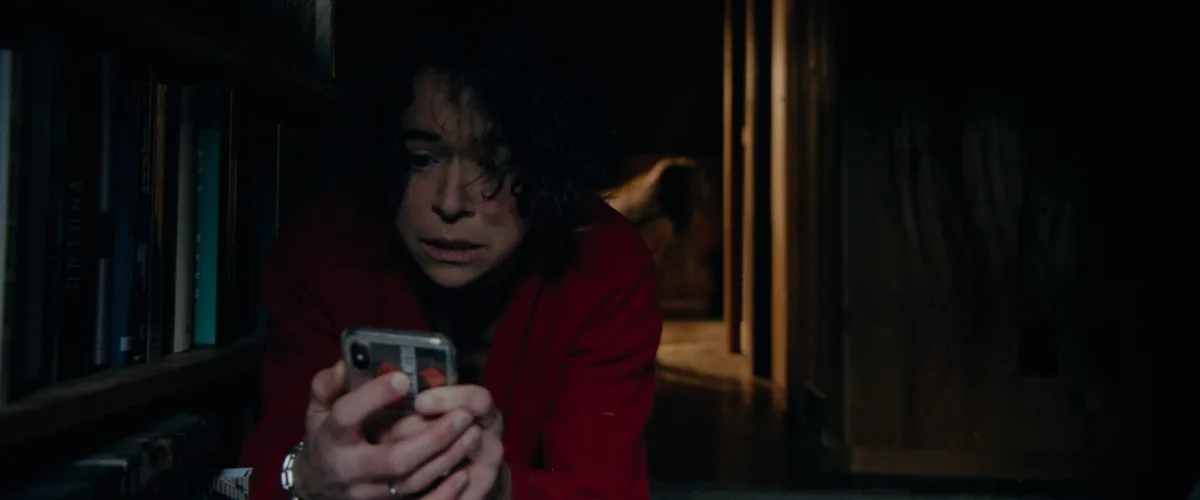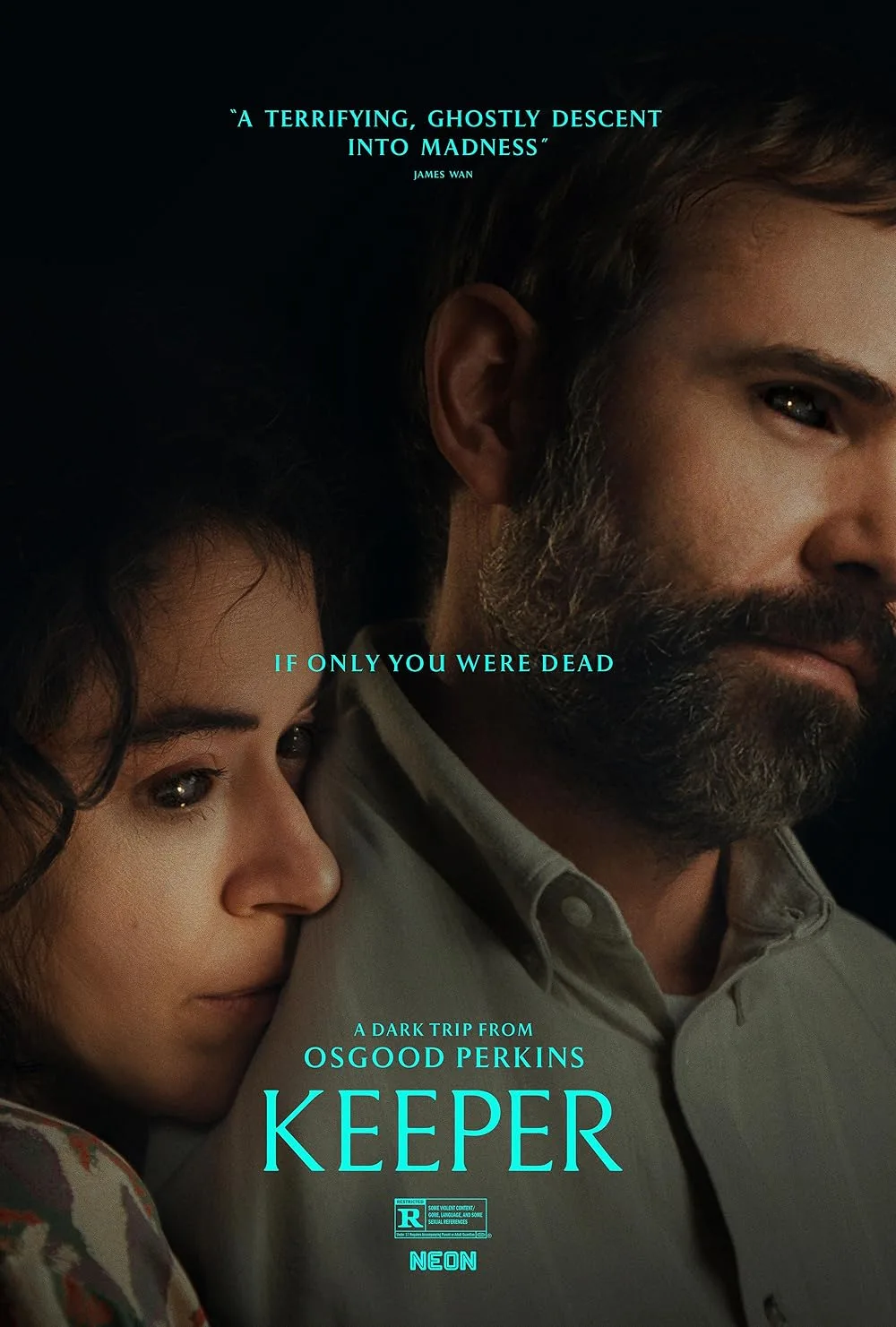Near the end of its runtime, Osgood Perkins’ “Keeper” suddenly remembers that it’s a horror movie and unleashes the long-gestating frights it’s been teasing at the periphery. That release might have felt like a genuine payoff if the minutes beforehand weren’t such a circuitous slog. Instead, the final moments where Perkins lets his freak flag fly feel more like catharsis because finally, something interesting has happened.
On paper, the premise of “Keeper” seems a prime target for Perkins to deploy his subversive idiosyncrasies. He’s brought his mordant blend of humor and dread to a police procedural like “Longlegs” and the fairy tale stories of “I Am the Pretty Thing That Lives in the House.” “Keeper” follows the cabin-in-the-woods archetype, focusing on Liz (Tatiana Maslany), who goes with her boyfriend of one month, Malcolm (Rossif Sutherland), for a weekend getaway to his remote cabin.
When the duo arrives at the residence, the film luxuriates in their ambling. It’s where the filmmaking is at its strongest because, by focusing on mood and production, “Keeper” serves as a calling card for Perkins to continue working with cinematographer Jeremy Cox, and editors Greg Ng and Graham Fortin. When the four join forces, they conjure a unique, dreadful alchemy. The house feels like it is its own character, with Cox giving it a personality by focusing on its numerous windows or the intricacies of its air vent.
Curiously, it’s hard to get a sense of how big the house is, which only adds to the eeriness. Rooms, doors, and even staircases are always framed in relation to the person inhabiting that space, and the shots are always up close rather than far out. It evokes the sense that an unseen, ancient force is closing in on these characters. The house has scars, and Cox isn’t afraid to open up the old wounds.
Likewise, Ng and Fortin enchant by crafting dissolves that would make Park Chan-wook proud, such as in one sequence where Liz runs her hand through her hair, with her strands and locks fading and match cutting into an establishing shot of the trees surrounding the cabin. It speaks not only to Liz’s traumas but also to her very body, which is tied to the land around her. The impending horror is not an outside force so much as it is already brewing under the surface of her skin.
With this set-up, it’s only a matter of time before things start to go awry, and “Keeper” introduces its terrors so nonchalantly as to induce ennui. Malcolm and Liz have their first dinner interrupted by Malcolm’s annoying cousin, Darren (Birkett Turton), and his date, Minka (Eden Weiss). Cox’s framing is worth mentioning again here, as the blocking underscores the theme of entrapment; each time we cut to the character who is speaking, the camera only captures the person and never the people around them, which makes it difficult to get a sense of what the shape of the table looks like. Liz is clearly uncomfortable with Darren but goes along to appease Malcolm, and after they leave, Malcolm insists she eat a slice of chocolate cake left behind by the housekeepers. Though she despises chocolate, she partakes, and, as in “Alice in Wonderland,” this act of consumption sets the supernatural events of the story in motion.
The only issue is that we’ve seen these tropes utilized many times over, and “Keeper” doesn’t seem interested in breaking the formula. The tactics are intriguing to a point but are diluted through incessant use. Liz will be doing some menial task, hear a strange noise, investigate and find nothing, and then be haunted in her dreams by some premonition from either the past or future. This same liturgical motion takes up the bulk of the film’s runtime, to the point where it feels like Perkins is trying to drive viewers into madness through repetition rather than offering visuals or scenes that can truly unsettle. Audiences embrace being trapped if it’s a result of investing in the story being told; the longer Nick Lepard’s script unspools, the more our engagement slips, and we feel caged by a writer who has written himself into a narrative cul-de-sac and doesn’t know how to liberate us.
Thankfully, thanks to Maslany’s multifaceted talents, the film never becomes unwatchable. As “Keeper” progresses, Liz is stripped of every guard rail, culminating when Malcolm leaves her to fend for herself for a while as he has to go into the city. Maslany can string disparate emotions together so they flow seamlessly into one another. It’s a marvel to see her face course with docility, then fear, and then madness, all within the blink of an eye. At the beginning, Liz is established as someone who isn’t able to “keep” a partner for long, and with Malcolm, she sees an opportunity to create something lasting.
You don’t get to pick the ghosts of the house you live in, and in the same way, Liz tries to accept the strange happenings of the cabin as the cost of being in a relationship. Can calls to sacrifice in the name of love be abused? How do we retain a sense of our own identity even while committing ourselves to another person? What does embracing trust look like when we’re used to people abandoning us? Maslany sells Liz’s crumbling sanity as she wrestles with the answers to those questions, embodying the ways fear, insecurity, and restlessness make monsters of us all.
While “Keeper” is not short on visual style or atmospheric tension, ultimately, it’s a tedious genre exercise undone by an undercooked narrative and its allergy to mystery. For those worried that “Longlegs”’s exposition dump was too subtle, fear not: this one features a character who quite literally has a sit-down to share the house’s horrific lore. Here, Perkins saps the power of a good mystery; often, the reasons we invent for the bad things that happen are scarier than the real ones. As the film shows, not everything is worth giving. Some things are better kept away.




















